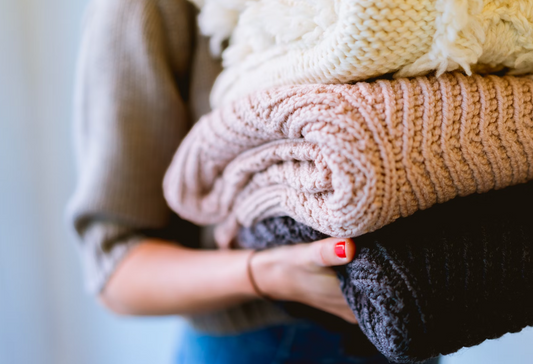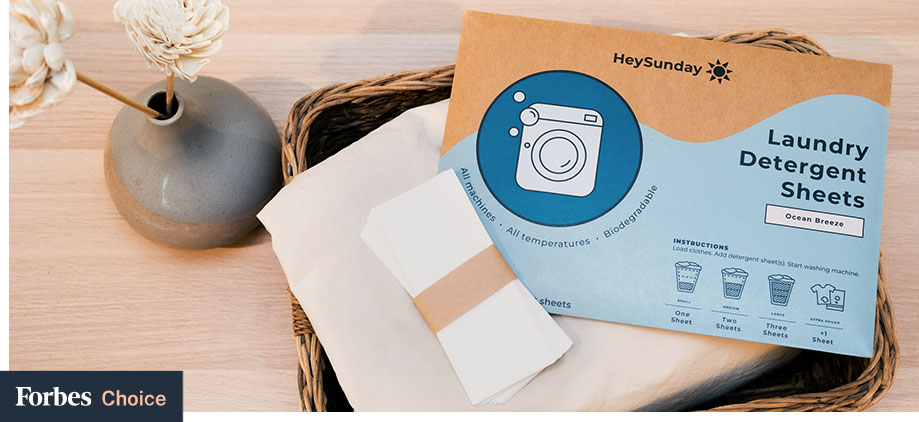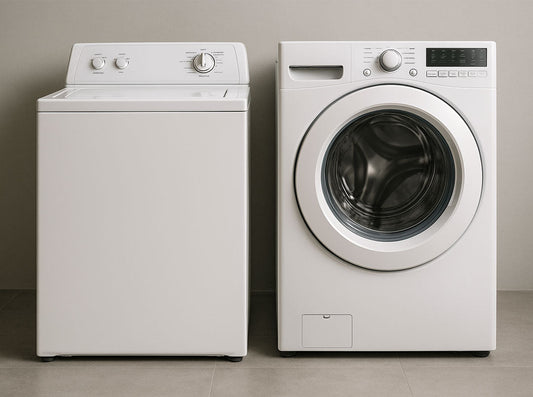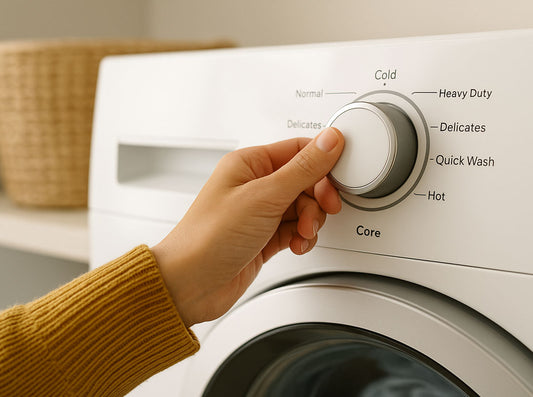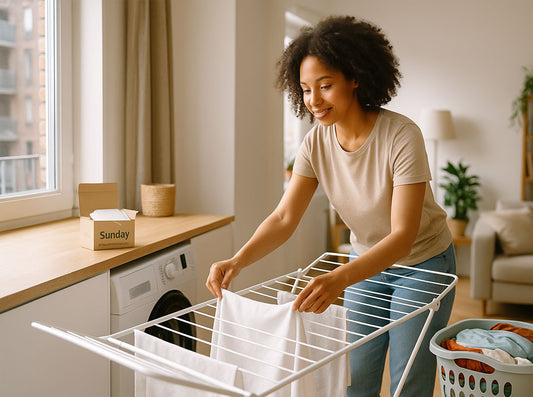Everywhere you look, brands are clamoring to promote products as all-natural or free of microplastics and harsh chemicals. While this is, in our opinion, a noble pursuit, it seems like every week brings a new "problem ingredient" to look out for, to the point that it can feel impossible to know which products and brands to trust.
Lately, polyvinyl alcohol (PVA) has been one of the most hotly discussed of these ingredients. Below, we'll go over the actual data and research into PVA, whether it's actually something to avoid, and where the outcry over its potential health concerns came from in the first place.
By doing so, we hope to give you the information you need to know for certain if HeySunday's detergent sheets (or similar products) are a product you can trust to keep you safe and clean.
What Is PVA?
Also known as polyvinyl alcohol, PVA is a water-soluble polymer commonly used in food packaging, the textile industry, thickeners or emulsifiers, 3D printing, and even eye drops. Although the conversation around PVA has become more mainstream in the last year or so (largely due to a single study that we'll speak about later), the material itself has been in use for almost a century.
First discovered in 1912 by Dr. Fritz Klatte, a Nobel Prize-winning chemist, PVA played a crucial role in manufacturing everything from your car's headlights to cosmetics and medical devices. More recently, polyvinyl alcohol has been used to create alternatives to traditional laundry detergent, such as detergent pods or laundry sheets.
Explained in the most basic terms, PVA is a specific mixture of water and the same kind of glue you'd find in a woodshop or school, which is also known as polyvinyl acetate. When added to a material, such as concrete or fiberglass, this mixture improves a structure's strength and creates a clear, water-resistant film to protect against grease, oils, and moisture.
How Do Detergent Companies Use PVA?
Today, many eco-friendly detergent brands have begun using a reliable, dissolvable PVA "film" around laundry and dishwasher pods or as the structure for detergent sheets. By using a material like this, products can deliver cleaning agents in a more convenient, mess-free way than traditional liquid laundry detergents.
Even better, PVA can help prevent dirt or stains from re-entering fabrics during the wash cycle. This means that although PVA isn't technically a cleaning agent itself, it can produce better results when used alongside other ingredients, such as the plant-based surfactants we use in HeySunday's detergent sheets.
Conversely, detergent brands that don't use PVA may struggle to provide as much convenience or cleaning power as those that do. So, while some people may opt for an entirely plastic-free product despite the evidence showing that PVA is safe, this choice often comes at the cost of cleaning power and efficiency.
Should We Be Scared of PVA?
Once you've learned that PVA is a simple mixture of glue and water that's been used extensively for almost a century, you may start to wonder why everyone is suddenly up in arms about its use in laundry pods and other cleaning products.
In our experience, this is partially due to much-needed efforts to improve environmental health and reduce plastic pollution, such as that caused by the bulky plastic jugs used to transport liquid laundry detergent.
That said, experts have been studying PVA's impact on the environment for decades, with an overwhelming amount of evidence to support the claim that PVA plastic is perfectly safe to use. Still, a recent study that was backed and funded, in part, by a cleaning products company named Blueland suggested that PVA may accumulate in wastewater treatment plants without fully biodegrading.
The Blueland Report
In 2021, a collaboration between pollution researchers and Blueland, an eco-friendly company advertising plastic-free detergents and cleaners, attempted to research whether PVA fully broke down when passed through water treatment facilities and, if not, the impact it may have on the environment.
This study came about despite the dozens of similar studies into PVA's safety, with many concluding that PVA is non-toxic even when consumed orally in food or pharmaceutical supplements.
Still, the Blueland report claimed that, although the PVA used in detergent pods and other products fully dissolves within 90 days, it may negatively impact the environment due to the way it interacts with bacteria and other biological matter.
By the end of the report, experts concluded that "more research is required to determine their [PVA particles'] impact on the environment relative to other, more conventional plastics..."
While both Blueland and the researchers responsible for the study claimed that their conclusion was not biased in any way, we find it important to note that the study only examined the types of detergent pods and other products in direct competition with Blueland's brand.
The EPA's Response
After this research was complete, on January 26, 2023, Blueland petitioned the U.S. Environmental Protection Agency, or EPA, to require manufacturers of PVA products to pay for additional third-party research into the material's safety. Also, the petition asked the EPA to change PVA's status from "green," or completely safe, to "grey," meaning that the material's safety was unclear.
After careful consideration, on April 21, 2023, the EPA denied both requests, saying that Blueland and the other petitioners had failed to provide the facts and evidence needed to discount almost a century of other studies into PVA.
Additionally, the EPA took special care to deny Blueland's demand for third-party testing, both because the EPA follows the golden standard for environmental testing and because the EPA does not have the authority to force businesses to pay for extra testing out of pocket.
Who Should You Trust?
Because HeySunday is devoted to creating effective, eco-friendly options for those who care about performance and the environment, we fully understand the desire to learn more about which brands and products you choose to trust.
We also understand that reliable research and a healthy dose of skepticism are crucial for building that trust, which is why we decided to give you the facts and resources you need to decide for yourself whether PVA products are something you believe in.
At the end of the day, HeySunday believes in the EPA, its guidelines and scientific backing, and the care it puts into debating every petition and study put before it. That's why we use extensive third-party testing to ensure we meet every standard put forward by the organization. So, until the EPA decides to change its long-standing ruling on the safety of PVA, we'll keep using it to make our products as effective as possible.
That said, the choice is ultimately yours. If you do decide that you trust the science, like us, then consider checking out our environmentally-friendly laundry detergent sheets to see if they might be right for you and your home.
Frequently Asked Questions
Do laundry detergent sheets dissolve?
Yes! Multiple studies have shown that the PVA used to make laundry detergent sheets fully dissolves in conventional wastewater treatment facilities within 90 days.
Does HeySunday use third-party testing?
All of HeySunday's products undergo extensive third-party testing to ensure they're up to our strict safety and performance standards, avoiding carcinogens, bleaches, phosphates, and other harsh chemicals.
How does HeySunday help the environment?
HeySunday tackles pollution in the detergent industry at its most impactful source: packaging. Unlike traditional detergents, which use heavy plastic jugs and other non-recyclable materials, we use only the most biodegradable materials to pack and ship our sheets. Additionally, our sheets do not use the potentially toxic chemicals used in many liquid detergents, like 1-4, dioxane.
Does HeySunday guarantee their products?
Every order of HeySunday detergent sheets comes backed by a 100% money-back guarantee because we're confident that you'll love them from the first use.
Do laundry detergent sheets work?
One of the biggest issues we saw with other detergent sheets wasn't their eco-friendliness but simply their inability to clean as well as liquid options. Because of that, we made sure our formula was designed with powerful plant-based surfactants and natural cleaners to ensure a clean conscience didn't come at the expense of a clean home.
